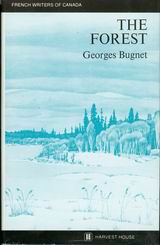The Forest

This novel was written in French by Georges Bugnet in his homestead during the Great Depression and published in 1935 as La Foret
It was translated by David Carpenter and published in 1976. Carpenter had become friends with Bugnet during the last ten years of Bugnet's life.
The novel, in all its gruelling details of survival in the bush, is quite autobiographical, but most of the story is told from the point of view of the wife, Louise Bourgoin. She and her husband Roger arrive in the wilds of Northwestern Alberta from France, determined to become successful farmers, raise a family, sell their farm, and retire back to France to live the good life. First, however, they have to deal with the forest.
Critical Response
Last week I was asked what was the finest novel of the Canadian West. I quickly thought of two deeply sincere and tragic novels, F.P. Grove's Settlers of the Marsh and Sinclair Ross's
George Bugnet, novelist, dramatist, poet, and critic, is one of the really important Canadian writers. In him an intellect and spirit of a very high order unite with long experience of life in the wilderness; and the result has been a literary work in which the materials of the frontier have been wrought into designs of lasting beauty, and their meaning presented with an unwavering courage. The Forest relates the tragic struggle of a young urban [man] and his wife with ... nature. They come from France with a romantic wish to pioneer beyond all the farms in the district, on the edge of a great lake, in the midst of a green forest. It is a great and tragic book. We do not have many such.
- E.K. Brown
